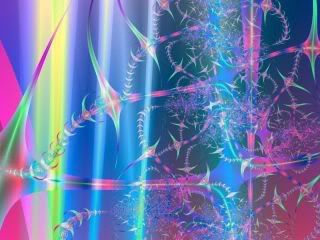I borrowed that title from a mind-blowing album of the same
name by the late Ustad Vilayat Khan.
I often hear deeply wrenching Raagas that leave me baffled.
Simple scales, a complex seeding of emotions in its patterns,
an infuriating dead-end in its analysis…well, you've got to
be there to really understand, otherwise I probably seem to
be talking nonsense.
Jhinjhoti is a fantastic Raaga that can cause a lot of
distress. Two other Raagas that do the same to me are
Charukesi and
Bhairavi but that's not for now.
Here is Jhinjhoti by Shubra Guha. Notice how the composition
is "off-beat" and also ends on the Shuddha Gandhar, talked
about below.
Nevertheless, let's move on. Jhinjhoti belongs to the
Khamaj root. Saying so implies the existence of Komal Nishaad,
which is certainly the case. Shuddha Nishaad is rare,
though it can show up. But the pivot is Shuddha Gandhar.
Like a powerful magnet, it attracts all patterns a musician
might want to create such that the emphasis is on that
note again and again. You just can't get away from it.
Many Raags have this 'annoying' problem and some mistake
it for a weary repetitiveness, which is far from the case.
Shuddha Gandhar has a powerful magic in many Raagas that
causes it seem almost primordial. It happens to be my
favourite note. You'll find its beauty in Charukesi too.
In Jhinjhoti, the note's beautiful counterpoint is the
drooping Komal Nishaad, though some would argue its the
Shuddha Dhaivat.
Like other Raags that sound good in a particular octave,
Jhinjhoti is beautiful in the middle one, that which comes
naturally.
This seems a particular favourite of the Vilayat Khan clan,
I think. I have heard pieces by Imrat Khan and others too.
I have a wonderful delicate Jhinjhoti piece of the late
Pandit Jog and Zakir Hussain which never fails to bring
tears to my eyes.
Here are examples
- N. Rajam
- Hari Prasad Chaurasia
- Roshanara Begum
- Abdul Karim Khan
- A nice intro
- A Jhinjhoti mix from Mere Mehboob - click on the first one
- Something from Kishore Kumar - click on the last one
- Mehdi Hasan
I do speak of Jhinjhoti in the penultimate chapter of my
book "What the Raags told me" where I try to describe it
is the Raaga of Memories. That's why the title "Colours
of Jhinjhoti" also made perfect sense. There is truly a
huge variety of emotions that Jhinjhoti describes well;
you'll see it in plenty of Thumris, for example. For
that reason, a lot of people feels it's a 'light' Raaga,
though I personally do not think so. Maybe it just shows
how versatile it is.
Enjoy Jhinjhoti, the Raaga of Memories!
VM

4 comments:
I happened to come upon your blog when I googled for 'jhinjhoti' - the raag I am currently listening to. It's a nice detailed rendition by the now reliable Ashwini Bhide available at... http://www.itcsra.org/aom/artist_ofthe_month.asp?aomid=57
To say the least, I found your analysis very interesting, though a tad unconventional :) - but I guess that's the beauty of ragas...we can approach them as grammarians, scientists, painters, or poets and they yield to every approach.
Needless, to say you have a regular visitor at your blog...
Regards,
Abhishek
P.S. I was witness to a more robust though less 'distressing' approach by Rajan and Sajan Mishra at a live concert. If you are interested I can send you the recording :)
Speaking of the annoying repetition problem - another raag that you may consider is Nand...
It requires a lot of ingenuity to sing this for above 15 minutes IMO - due to which perhaps the best rendition there is of Nand is the 7 minute classic by Kumar Gandharva :)
Regards,
Abhishek
Dear Prof,
Just to compliment on your blog that i will visit again and again....writing this while listening to Shubra Guha and Raga Jhinjoti....khamaj is one of my favorite ragas
Thank you so much for a painstakingly put-together and beautiful blog
Hi ! Great article .. Would you mind shareing the name of the CD/provenance of the Jog/Zakir hussain recording that you mention in your blog ? I came across your article while trying to track down a jhinjhoti recording (from an old radio program on WDUQ). It definitely doesnt match the few jhinjhoti recordings of Jog's that are on the web exactly, but its close.
Post a Comment